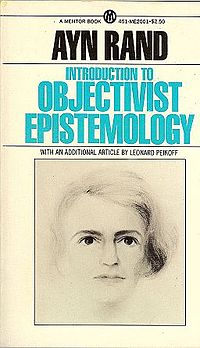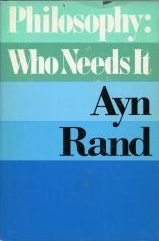
Alice O'Connor, better known by her pen name Ayn Rand, was a Russian-born American writer and philosopher. She is known for her fiction and for developing a philosophical system she named Objectivism. Born and educated in Russia, she moved to the United States in 1926. After two early novels that were initially unsuccessful and two Broadway plays, she achieved fame with her 1943 novel, The Fountainhead. In 1957, Rand published her best-known work, the novel Atlas Shrugged. Afterward, until her death in 1982, she turned to non-fiction to promote her philosophy, publishing her own periodicals and releasing several collections of essays.
Objectivism is a philosophical system developed by Russian-American writer and philosopher Ayn Rand. She described it as "the concept of man as a heroic being, with his own happiness as the moral purpose of his life, with productive achievement as his noblest activity, and reason as his only absolute".

Leonard Sylvan Peikoff is a Canadian-American philosopher. He is an Objectivist and was a close associate of Ayn Rand, who designated him heir to her estate. He is a former professor of philosophy and host of a nationally syndicated radio talk show. He co-founded the Ayn Rand Institute (ARI) in 1985 and is the author of several books on philosophy.

We the Living is the debut novel of the Russian American novelist Ayn Rand. It is a story of life in post-revolutionary Russia and was Rand's first statement against communism. Rand observes in the foreword that We the Living was the closest she would ever come to writing an autobiography. Rand finished writing the novel in 1934, but it was rejected by several publishers before being released by Macmillan Publishing in 1936. It has since sold more than three million copies.
This is a bibliography for Ayn Rand and Objectivism. Objectivism is a philosophical system initially developed in the 20th century by Rand.

Introduction to Objectivist Epistemology is a book about epistemology by the philosopher Ayn Rand. Rand considered it her most important philosophical writing. First published in installments in Rand's journal, The Objectivist, July 1966 through February 1967, the work presents Rand's proposed solution to the historic problem of universals, describes how the theory can be extended to complex cases, and outlines how it applies to other issues in the theory of knowledge.
David Christopher Kelley is an American philosopher. He is a professed Objectivist, though his position that Objectivism can be revised and influenced by other schools of thought has prompted disagreements with other Objectivists. Kelley is also an author of several books on philosophy and the founder of The Atlas Society, an institution he established in 1990 after permanently dissociating with Leonard Peikoff and the Ayn Rand Institute.

The Early Ayn Rand: A Selection from Her Unpublished Fiction is an anthology of unpublished early fiction written by the philosopher Ayn Rand, first published in 1984, two years after her death. The selections include short stories, plays, and excerpts of material cut from her novels We the Living and The Fountainhead.

Objectivism: The Philosophy of Ayn Rand is a 1991 book by the philosopher Leonard Peikoff, in which the author discusses the ideas of his mentor, Ayn Rand. Peikoff describes it as "the first comprehensive statement" of Rand's philosophy, Objectivism. The book is based on a series of lecture courses that Peikoff first gave in 1976 and that Rand publicly endorsed. Peikoff states that only Rand was qualified to write the definitive statement of her philosophic system, and that the book should be seen as an interpretation "by her best student and chosen heir." The book is volume six of the "Ayn Rand Library" series edited by Peikoff.
The Nathaniel Branden Institute (NBI), originally Nathaniel Branden Lectures, was an organization founded by Nathaniel Branden in 1958 to promote Ayn Rand's philosophy of Objectivism. The institute was responsible for many Objectivist lectures and presentations across the United States. Many of those associated with NBI worked on the Objectivist magazines, The Objectivist Newsletter and The Objectivist.

The Romantic Manifesto: A Philosophy of Literature is a collection of essays regarding the nature of art by the philosopher Ayn Rand. It was first published in 1969, with a second, revised edition published in 1975. Most of the essays are reprinted from Rand's magazine The Objectivist.
The Objectivist movement is a movement of individuals who seek to study and advance Objectivism, the philosophy expounded by novelist-philosopher Ayn Rand. The movement began informally in the 1950s and consisted of students who were brought together by their mutual interest in Rand's novel, The Fountainhead. The group, ironically named "the Collective" due to their actual advocacy of individualism, in part consisted of Leonard Peikoff, Nathaniel Branden, Barbara Branden, Alan Greenspan, and Allan Blumenthal. Nathaniel Branden, a young Canadian student who had been greatly inspired by The Fountainhead, became a close confidant and encouraged Rand to expand her philosophy into a formal movement. From this informal beginning in Rand's living room, the movement expanded into a collection of think tanks, academic organizations, and periodicals.
Ayn Rand's philosophy of Objectivism has been and continues to be a major influence on the right-libertarian movement, particularly libertarianism in the United States. Many right-libertarians justify their political views using aspects of Objectivism.
The Randian hero is a ubiquitous figure in the fiction of 20th-century novelist and philosopher Ayn Rand, most famously in the figures of The Fountainhead's Howard Roark and Atlas Shrugged's John Galt. Rand's self-declared purpose in writing fiction was to project an "ideal man"—a man who perseveres to achieve his values, and only his values.
Ayn Rand, author and developer of Objectivism, held controversial views regarding homosexuality and gender roles. Although Rand personally viewed homosexuality negatively, considering it immoral and disgusting, she endorsed non-discrimination protection for homosexuals in the public sphere while opposing laws against discrimination in the private sector on the basis of individual rights.

Philosophy: Who Needs It is a collection of essays by the philosopher Ayn Rand, published posthumously in 1982. It was the last book on which Rand worked during her lifetime.

Atlas Shrugged is a 1957 novel by Ayn Rand. It was her longest novel, the fourth and final one published during her lifetime, and the one she considered her magnum opus in the realm of fiction writing. Atlas Shrugged includes elements of science fiction, mystery, and romance, and it contains Rand's most extensive statement of Objectivism in any of her works of fiction. Rand described the theme of Atlas Shrugged as "the role of man's mind in existence". The book explores a number of philosophical themes from which Rand would subsequently develop Objectivism, including reason, property rights, individualism, libertarianism and capitalism, and depicts what Rand saw as the failures of governmental coercion.
Objectivist periodicals are a variety of academic journals, magazines, and newsletters with an editorial perspective explicitly based on Ayn Rand's philosophy of Objectivism. Several early Objectivist periodicals were edited by Rand. She later endorsed two periodicals edited by associates, and a number of others have been founded since her death.

Journals of Ayn Rand is a book derived from the private journals of the novelist and philosopher Ayn Rand. Edited by David Harriman with the approval of Rand's estate, it was published in 1997, 15 years after her death. Some reviewers considered it an interesting source of information for readers with an interest in Rand, but several scholars criticized Harriman's editing as being too heavy-handed and insufficiently acknowledged in the published text.

We the Living is a two-part 1942 Italian romantic war drama film, based on Ayn Rand's 1936 novel of the same name. It was originally released as two films, Noi vivi and Addio Kira. It was directed by Goffredo Alessandrini and produced by Scalera Film, and stars Alida Valli as Kira Argounova, Rossano Brazzi as Leo Kovalensky, and Fosco Giachetti as Andrei Taganov.











